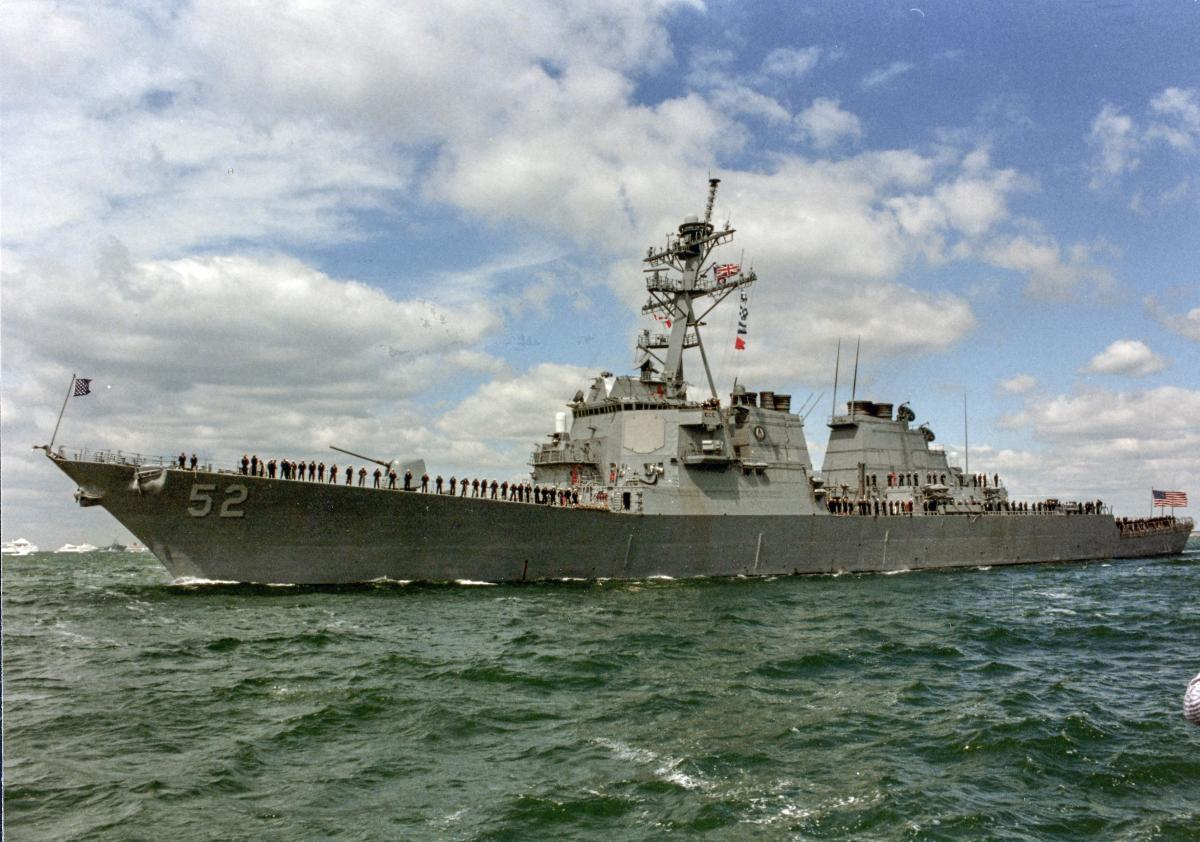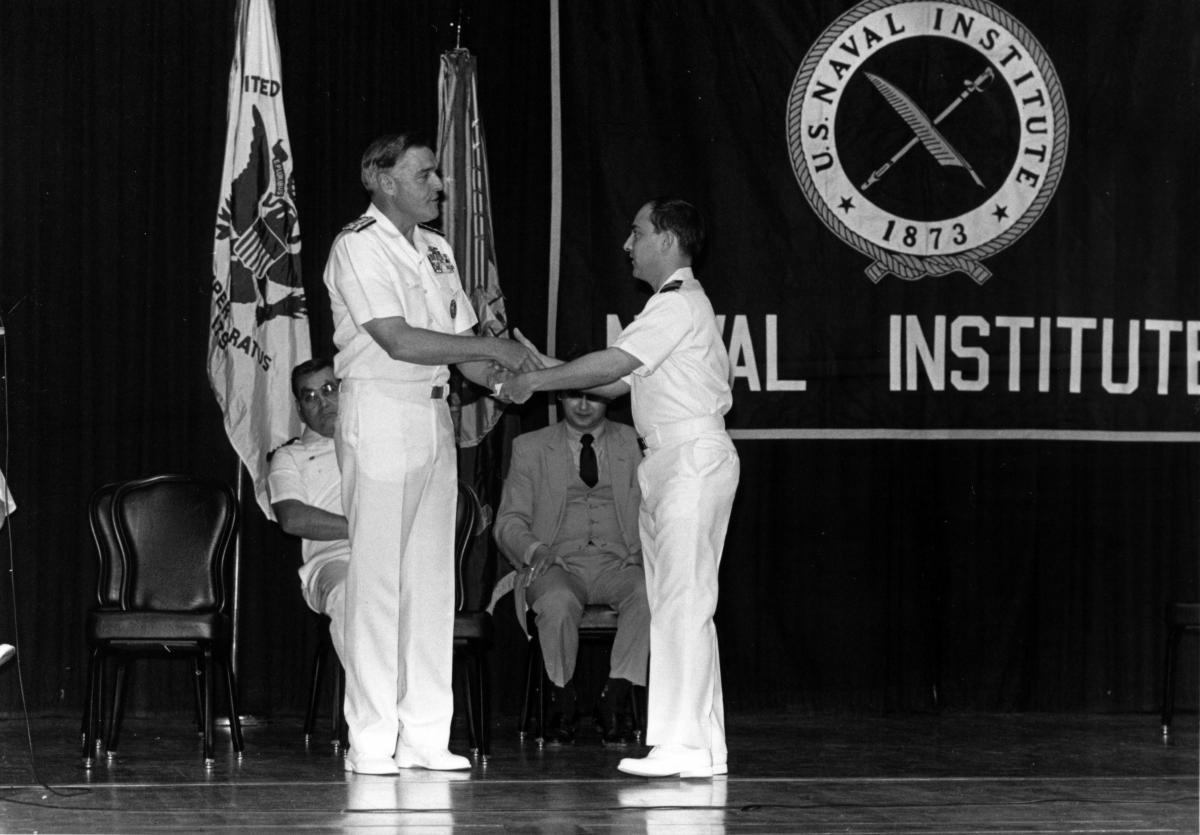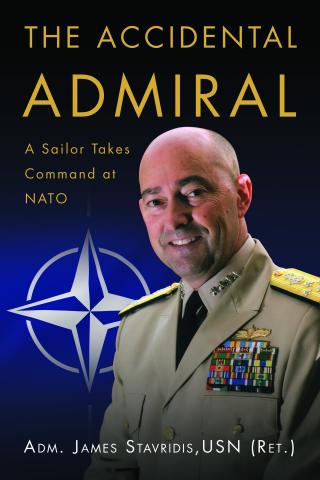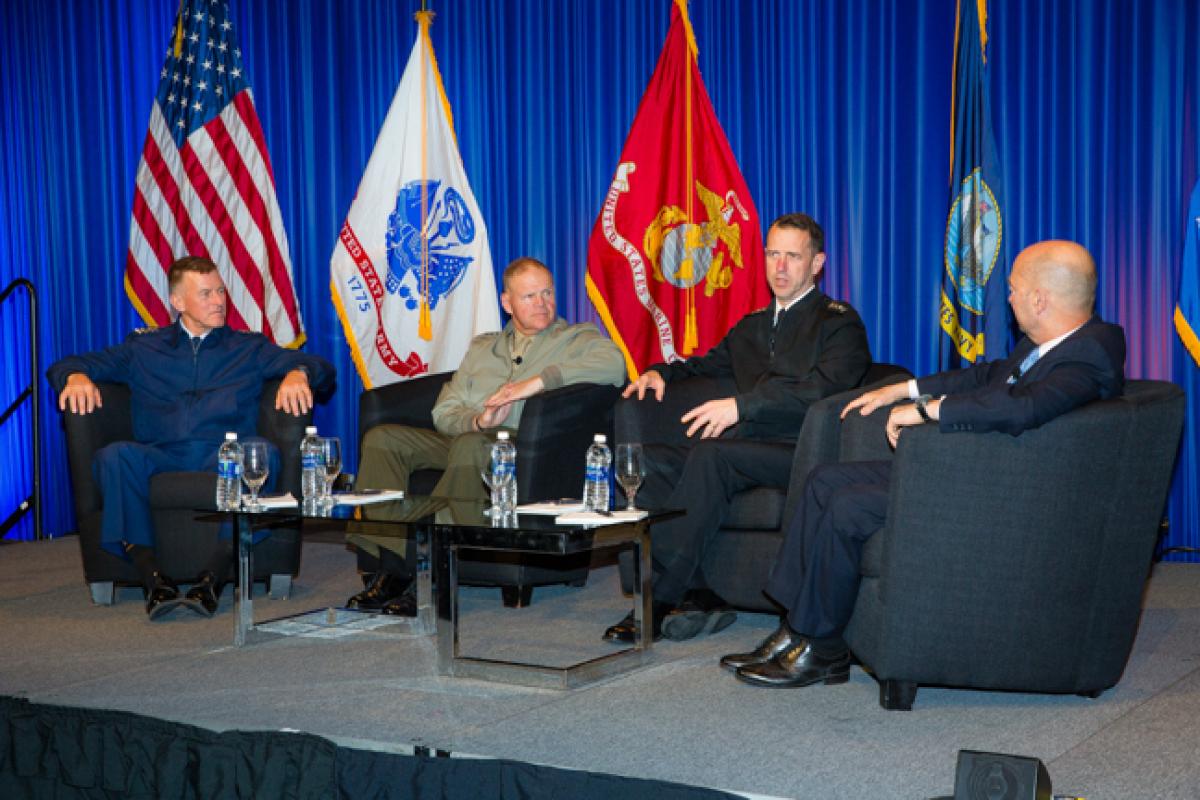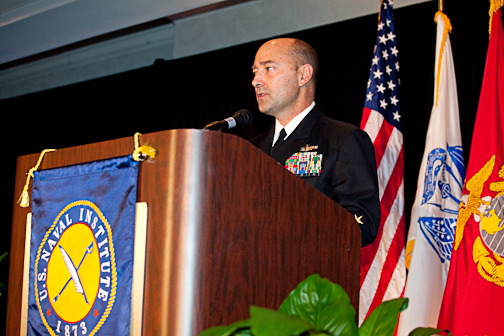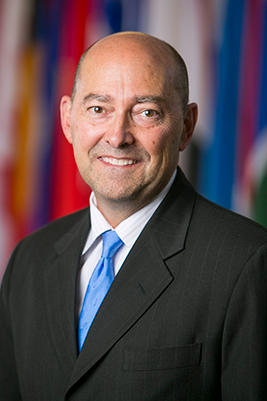
Stavridis, James G., Adm., USN (Ret.)
(1955–)
The Naval Institute Press is proud to present the long-awaited oral history of Admiral James G. Stavridis, USN (Ret.).
Admiral Stavridis, who recently retired as Dean of the Fletcher School of Law and Diplomacy at Tufts University, is a native of Florida. He attended the U.S. Naval Academy and spent over thirty years in the Navy, rising to the rank of four-star-admiral. Among his many commands were four years as Supreme Allied Commander at NATO, where he oversaw operations in Afghanistan, Libya, Syria, the Balkans, and counter piracy off the coast of Africa. He also commanded U.S. Southern Command charged with military operations through Latin America.
In the course of his career in the Navy, Admiral Stavridis served as senior military assistant to the Secretary of Defense. He led the Navy's premier operational think tank for innovation, Deep Blue, immediately after the 9/11 attacks.
He won the Battenberg Cup for commanding the top ship in the Atlantic Fleet and the Navy League John Paul Jones Award for Inspirational leadership, along with more than 40 U.S. and international medals and decorations.
He earned a PhD from the Fletcher School at Tufts, winning the Gullion prize as outstanding student in his class, as well as academic honors from the National and Naval War Colleges as a distinguished student. He is also the recipient of fifty medals, including 28 from foreign nations.
A popular author for the Naval Institute Press, Admiral Stavridis has published eight books on leadership, Latin America, shiphandling, and innovation, as well as more than 500 articles in leading journals (including a recent cover story for Time magazine). An active user of social networks, he has thousands of followers on Twitter and friends on Facebook. His TED talk on 21st-century security in 2012 has had over 1,000,000 views.
Admiral Stavridis is currently an operating executive of the Carlyle Group. He is also Chair of the Board of the U.S. Naval Institute, and has won both the Proceedings and Naval Institute Press Author of the Year Awards (1995 and 2010, respectively).
Transcripts of this oral history are available in many formats including bound volumes, and digital copies.
Order Oral HistoryBiography
Admiral James Stavridis, U.S. Navy (Ret.) is Chairman of the U.S. Naval Institute Board of Directors. He has served as Commander of European Command and as Supreme Allied Commander, Europe.
Stavridis is a 1976 distinguished graduate of the U.S. Naval Academy and a native of South Florida.
In 1998, he commanded Destroyer Squadron 21 and deployed to the Arabian Gulf, winning the Navy League's John Paul Jones Award for Inspirational Leadership.A Surface Warfare Officer, he commanded the Destroyer USS Barry (DDG-52) from 1993–1995, completing UN/NATO deployments to Haiti and Bosnia, and a combat cruise to the Arabian Gulf. Barry won the Battenberg Cup as the top ship in the Atlantic Fleet under his command.
From 2002–2004, he commanded Enterprise Carrier Strike Group, conducting combat operations in the Arabian Gulf in support of both Operation Iraqi Freedom and Operation Enduring Freedom.
From 2006–2009, he commanded U.S. Southern Command in Miami, focused on Latin America and the Caribbean.
Ashore, he has served as a strategic and long-range planner on the staffs of the Chief of Naval Operations and the Chairman of the Joint Chiefs of Staff. He has also served as the Executive Assistant to the Secretary of the Navy and the Senior Military Assistant to the Secretary of Defense.
Stavridis earned a PhD and MALD from The Fletcher School of Law and Diplomacy at Tufts University in International Relations in 1984, where he won the Gullion Prize as an outstanding student. He is also a distinguished graduate of both the National and Naval War Colleges.
From 2013–2018, he was Dean Emeritus, The Fletcher School of Law and Diplomacy at Tufts University.
He holds various decorations and awards, including two awards of the Defense Distinguished Service Medal, the Defense Superior Service Medal, and five awards of the Legion of Merit. He is author or co-author of several books on naval ship handling and leadership, including Command at Sea, Destroyer Captain, Partnership for the Americas about Latin America, and his latest The Accidental Admiral.
Professional Activities
-
Served as Supreme Allied Commander, NATO and commander of U.S. European Commander (2009–2013)
-
Chair of the Board, U.S. Naval Institute (2013–present)
-
Led U.S. Southern Command in Miami (2006–2009)
-
Served as Senior Military Assistant to Secretary of Defense and Secretary of the Navy
-
First commander of Navy’s “Deep Blue” strategic and tactical think tank after 9/11 Pentagon attacks (2001–2002)
Awards
-
Intrepid Freedom Award
-
Athenagoras Human Rights Award
-
Council on Foreign Relations International Affairs Fellow
-
Alfred Thayer Mahan Award
-
John Paul Jones Award
-
Arleigh Burke Award
-
Sarnoff Award (AFCEA International)
-
38 U.S. and international military medals
-
Gullion Prize (Top in class), The Fletcher School, Tufts University
Selected Writings
Periodicals
Proceedings
-
Maritime Hybrid Warfare is Coming, December 2016, Admiral (Retired)
-
What Are Young Leaders Reading?, February 2016, Admiral (Retired)
-
Special – A Mechanism for Arctic-Crisis Response, December 2015, Admiral (Retired)
-
Russia: Why Can’t We Just Get Along?, October 2014, Admiral (Retired)
-
Digitizing Proceedings, May 2014, Admiral (Retired)
-
Time for a U.S. Cyber Force, January 2014, Admiral (Retired)
-
'A Difference Between Knowledge and Wisdom', August 2013, Admiral (Retired)
-
Comment and Discussion, June 2011, Admiral
-
Comment and Discussion, January 2011, Admiral
-
Teaching the Ropes, May 2010, Admiral
-
Sailing Across the Bridge, October 2009, Admiral
-
Read, Think, Write, and Publish, August 2008, Admiral
-
Journal of a First Command, April 2008, Admiral
-
Sailing in Southern Waters: A New Wind, May 2007, Admiral
-
Deconstructing War, December 2005, Vice Admiral
-
From Sword to Shield: Naval Forces in the Global War on Terror, August 2004, Rear Admiral
-
Adapting Aviation Tactical Training for the Surface Warfare Community, January 2003, Rear Admiral
-
Comment and Discussion, February 2003, Rear Admiral
-
Comment and Discussion, June 2002, Rear Admiral
-
Making Room for Risk: Managing Disruptive Techniques, September 2001, Rear Admiral
-
Requiem for a Sailor's Writer, May 2000, Captain
-
They Got Game, June 1999, Captain
-
A Perfect Form One, October 1995, Commander
-
Handling the Arleigh Burkes, October 1994, Commander
-
To Begin Again, July 1993, Commander
-
Beyond Joint: The Interagency Action, May 1993, Commander
-
A Measure of Success, February 1992, Commander
-
Aegis and the Third World, September 1990, Lieutenant Commander
-
New Era Tactics, July 1990, Lieutenant Commander
-
Comment and Discussion, April 1989, Lieutenant Commander
-
Comment and Discussion, February 1988, Lieutenant Commander
-
Creating ASW Killing Zones, October 1987, Lieutenant Commander
-
An Alliance for the Pacific, July 1987, Lieutenant Commander
-
Handling a Ticonderoga, January 1987, Lieutenant Commander
-
The Global Maritime Coalition, April 1985, Lieutenant Commander
-
Resource Wars, January 1985, Lieutenant Commander
-
Naval Strategy and National Ocean Policy, July 1984, Lieutenant Commander
-
Comment and Discussion, March 1984, Lieutenant Commander
-
War, Peace, and Leadership, August 1983, Lieutenant
-
Comment and Discussion, October 1982, Lieutenant
-
Closing the Gaps in Naval Leadership, July 1982, Lieutenant
-
A New SWO Billet in the Carrier, January 1982, Lieutenant
-
On Leading Snipes, January 1981, Lieutenant
-
Handling a Spruance Class Destroyer, October 1979, Lieutenant (junior grade)
-
Comment and Discussion, April 1979, Lieutenant (junior grade)
-
Comment and Discussion, September 1977, Ensign
Other Periodicals
Americas Quarterly
-
"The Americas: We’re All in This Together." Americas Quarterly Fall 2007. (Admiral)
The Atlantic
-
"37 Years in the Navy." July 2013 (Admiral, Retired)
Atlantic Council
-
"NATO: A Bridge Across Time." (PDF) Freedom's Challenge – Marking the 20th Anniversary of the Fall of the Berlin Wall December 2009: 134–135. (Admiral)
Foreign Policy
-
"Flash Point in the Eastern Mediterranean." July 2013 (Admiral, Retired)
Joint Force Quarterly
-
"An Intelligent Theater." (PDF) Joint Force Quarterly 1st Quarter 2010: 104–108. (Admiral)
-
"Whatever Happened to the 'War on Drugs?'" (PDF) Joint Force Quarterly 4th Quarter 2008: 109–113. (Admiral)
-
"Strategic Communication and National Security." (PDF) Joint Force Quarterly 3rd Quarter 2007: 4–7. (Admiral)
-
"The Second Revolution." (PDF) Joint Force Quarterly Spring 1997: 8–13. (Captain)
Military Review
-
"Strengthening the Bridge: Building Partnership Capacity." (PDF) Military Review January–February 2010: 2–6. (Admiral)
-
"Partnership for the Americas: The Human Rights Initiative." (PDF) Military Review May–June 2007: 2–8. (Admiral)
Naval Law Review
-
"United Nations of the Sea Treaty: Time for a Review?" Naval Law Review Spring 1992: 78–88. (Commander)
Naval War College Review
-
"Taming the Outlaw Sea." (PDF) Naval War College Review Autumn 2010: 72–83. (Admiral)
-
"Perspectivas sobre estrategia marítima," Introducción: Una Estrategia Marítima en las Américas, Naval War College Press Winter 2009: vii–xi. (Admiral)
-
"The Heart of an Officer." (PDF) Naval War College Review Spring 2009: 26–41. (Admiral)
-
"Sailing to a New Port." (PDF) Naval War College Review Summer 2007: 7–13. (Admiral)
-
"The Tale of the Red Knight." (PDF) Naval War College Review Autumn 2001: 141–147. (Rear Admiral)
-
"Marine Technology Transfer and the Law of the Sea." (PDF) Naval War College Review JulyAugust 1983: 38–50. (Lieutenant Commander)
RUSI Journal
-
"NATO Taking a Fix—Charting a Course" RUSI Journal December 2009: 44–47. (Admiral)
Shipmate
-
"Time." (PDF) Shipmate June 2010: 38. (Admiral)
-
"U.S. Fourth Fleet: One Year Update." (PDF) Shipmate July–August 2009: 38. (Admiral)
-
"Semi-submersibles: An Emerging Threat in the Americas." (PDF) Shipmate May 2008: 36. (Admiral)
-
"Humanitarian Operations: Evolving Missions and New Approaches." (PDF) Shipmate January–February 2008: 25–27. (Admiral)
Books
-
Division Officer's Guide, Twelfth Edition, Naval Institute Press, Co-authored by Rear Admiral Robert Girrier (Ret.), Commander Jeffery Heames, and Commander Thomas Ogden, 2017.
-
The Leader's Bookshelf, Naval Institute Press, Co-authored by R. Manning Ancell, 2017.
-
The Accidental Admiral: A Sailor Takes Command of NATO, Naval Institute Press, 2014.
-
Partnership for the Americas: Western Hemisphere Strategy and U.S. Southern Command, National Defense University Press, 2010.
-
Command at Sea, Sixth Edition, Naval Institute Press, Co-authored with Rear Admiral Robert Girrier, 2010.
-
Destroyer Captain, Naval Institute Press, hardcover in 2007, paperback in 2014.
-
Watch Officer's Guide, Fifteenth Edition, Naval Institute Press, Co-authored with Captain Robert Girrier, 2006.
-
Division Officer's Guide, Eleventh Edition, Naval Institute Press, Co-authored with Commander Robert Girrier, 2005.
TED Talk
"James Stavridis: A Navy Admiral's thoughts on global security." June 2012 (Admiral)
Speeches
As a session in the Maritime Security Dialogue Series, cosponsored by the U.S. Naval Institute and CSIS. Admiral Stavridis facilitated a discussion to launch the "Cooperative Strategy for the 21st Century Seapower" with Navy CNO Jonathan Greenert, Marine Commandant Joseph Dunford, and Coast Guard Commandant Paul Zukunft on 13 March 2015 in Washington, D.C.
Book Reviews—Proceedings
-
"In the Hurricane's Eye: The Genius of George Washington and the Victory at Yorktown," February 2019, Admiral (Retired)
-
"Churchill and Orwell: The Fight for Freedom," July 2017, Admiral (Retired)
-
"Sea Power: The History and Geopolitics of the World's Oceans," June 2017, Admiral (Retired)
-
"One Minute to Midnight," March 2009, Admiral
-
"The Far Reaches," September 2007, Admiral
-
"Six Frigates," December 2006, Admiral
-
"Sea of Thunder," November 2006, Admiral
-
"The 33 Strategies of War," July 2006, Vice Admiral
-
"Command at Sea," June 2005, Vice Admiral
-
"The Tragedy of Great Power Politics," July 2002, Rear Admiral
-
"A Soldier's Duty," August 2001, Rear Admiral
-
"Beyond the Law of the Sea: New Directions for U.S. Ocean Policy," March 1999, Captain
-
"Retreat from Doomsday," July 1989, Lieutenant Commander
-
"Supercarrier," February 1987, Lieutenant Commander
-
"Navy and Empire," September 1984, Lieutenant Commander
-
"The Geography of Warfare," November 1983, Lieutenant Commander
Book Reviews—Naval History
-
"Black Flags: The Rise of ISIS," June 2016, Admiral
-
"Sea of Gray: The Around-the-World Odyssey of the Confederate Raider Shenandoah," June 2006, Vice Admiral
-
"A Dishonorable Few," December 2005, Vice Admiral
-
"The Cruise of the Sea Eagle: The Amazing True Story of Imperial Germany's Gentleman Pirate," October 2005, Vice Admiral
-
"Patrick O'Brian: A Life Revealed," October 2000, Captain
-
"Damn the Torpedoes," October 1999, Captain
U.S. Naval Institute Honors Night: Commemorating the Naval Institute's 137th Anniversary
Keynote Address by Admiral James Stavridis, U.S. Navy, October 2010
Thank you very much, Tom, for that extremely generous and mercifully short introduction! And let me say right up front: What a terrific group we have here tonight! Active duty, retired, soon-to-be-Commissioned; military and civilian; public and private sectors…this is simply wonderful to see!
Great to see so many mentors from across the years here, from Fox Fallon to Tom Marfiak to Jim Barber to Fred Rainbow. Fred gave me my start in the pages of Proceedings and I will never forget it. And the Commandant of the Coast Guard, my good friend Bob Papp—WOW.
Distinguished guests, friends and colleagues, members of and supporters of the Sea Services…SHIPMATES, all of you—good evening! WELCOME and thank you so much for joining us. It truly is an honor for me to be here tonight.
Thank you, Tom, for inviting me to speak at this wonderful event. I thought I’d limit my remarks to about 2 hours? Is that good for everyone? Get a drink now if you need one …
I am reminded at these “honors nights” at how old I am becoming. These are sort of the “five stages of a career,” which go like this:
“Who is Stavridis?”
“I hear good things about Stavridis”
“Get me Stavridis to work on this”
“You know, we need someone like Stavridis used to be”
And finally:
“Who is Stavridis?”
I am approaching if not passing through Stage five.
In all seriousness, before I go any further, I would like to underscore how I feel about the U.S. Naval Institute—a truly historic organization—and I would say, a “national treasure”—because of its…YOUR…OUR…tireless efforts to preserve, support and strengthen our maritime heritage and contributions to national security.
History is change. Generally chaotic change. And to recognize the waves that wash over us, to know the sea in which we swim, we need organizations like the Institute, with the Press and the Proceedings—highlighted by perhaps its most recognizable product Proceedings first published in 1874. I think I submitted an article for that first volume, actually…
You continue to allow members and supporters of the Sea Services to express their thoughts, share their ideas and at times challenge the “conventional wisdom”, sailing against the current, with or without the prevailing winds, as it were. And for that, we are stronger as a nation and I personally thank you!
Along these lines, tonight, I’d like to share just a couple thoughts I have regarding a subject that is very near and dear to my heart—and has been since I served as SALTY SAM for the class of 1976—and that is the topic of WRITING.
Over the years, I’ve often been asked three questions:
Why on earth do you write all those articles and books?
Where do you find the time to write given your responsibilities?
Were you ever concerned that writing/publishing would put your career at risk?
During the course of these short remarks, I hope to answer all three of those questions.
The question of why I, or any potential author, would write in the first place.
First I would say, we all begin as readers. I lived in Greece as a child and there was no television in those days, in the early 1960s. So I became an endless reader of books, a habit that continues to this day with nearly 5,000 books in my house—what my wife Laura calls my “gentle madness.”
Voltaire, Shakespeare, Joseph Conrad, Herman Melville, Ernest Hemingway, William Faulkner, Scott Fitzgerald, Cormac McCarthy, Elmore Leonard, Ha Jin, John Updike, Ian McEwan, Peter Carey, Chris Buckley, Patrick O’Brian … I could go on and on.
ADM James Stavridis, USN To view a slideshow of the 2010 Honors Night, click here.
But the key is that we all begin as readers.
Then something happens and you start to think … you want to be part of the conversation. You step from reading to thinking to talking about books and ideas.
And you realize that all that reading and thinking and talking is—in the end—like trying “to nail whispers to a wall” as a writer said once. “Writing freezes thought and offers it up for inspection.”
When you are lucky enough to be a sailor, there is an endless source of experience that connects somehow with what you have read and thought about and talked with others about.
And in my case at least, that leads to the desire to “freeze your thoughts” … to take responsibility for them, I suppose.
So I’ve written at every level—my High School paper the McClintock HS Guidon—the Log Magazine, where I was editor and then Salty Sam—Proceedings and other journals—and now blogs and posts and tweets—it is all for me the logical outgrowth of reading and thinking and learning—and hopefully freezing thought and being accountable for it.
You become part of the “great conversation” and hopefully contribute to it.
So the second question is where do I find the time to do all this writing? First I would say going to sea, for all its busy time, has provided a space for reading, looking at the rolling ocean, and doing a little writing. There were many times after a mid-watch when I wanted to sleep but thought—ah, just a minute or two to jot a line that came to me on a long, quiet steam across the Pacific.
And secondly, for me personally, I’ve always tried hard to manage my time carefully…to use small bits of time to chip away at important things. If you wait until you have six hours to sit down and write an article, the odds are that you’ll never find the time. But if you write a page or a paragraph here and there—while on an airplane or in a car ride—eventually you’ll have a good piece. Do that in an organized way over a year, and you’ll have a book. What seems like a big commitment in time is so often just a series of small steps.
This really isn’t that complicated. Without oversimplifying, it has never been easier to get started. One Greek philosopher said, “If you wish to be a writer, write.” All you need are some ideas you care about and pen and paper . . . or more likely, these days, just a keyboard and a hook up to the Internet. Today everyone has a microphone and everyone has a publisher. We are all simultaneously experiencing our 15 minutes of fame. So get in the mix …
My favorite pure writer, Ernest Hemingway, takes it one step further in typically descriptive language: “There is no rule on how to write. Sometimes it comes easily and perfectly; sometimes it’s like drilling rock and then blasting it out with charges.”
Now…what about the third question, the one regarding career risk? Quite the dilemma…at first blush. I’ve had two “career ending” moments in my 34 years in the Navy, both of which included the essential thought from a 3-star Admiral to a far junior me, “Stavridis, your career is over” based on an idea I had articulated in print.
On the other hand, maybe somewhere along the way someone noticed something I wrote and thought, “hmmm, maybe that junior officer is worth taking the time to meet with and talk to.” Some of the best career moments I’ve had came in that way—and there were many more of them than the other type. So it is a balance, like life generally is—a rheostat, not an on-and-off switch.
But the bottom line is that your ideas will not go anywhere unless you have the courage to “hang them out there” for others to see…
The enormous irony of the military profession is that we are huge risk takers in what we do operationally—flying airplanes on-and-off a carrier, driving a ship through a sea state five typhoon, walking point with your platoon in southern Afghanistan—but publishing can scare us badly. We are happy to take personal risk or operational risk, but too many of us won’t take career risk. And to compound this, sometimes mentors even advise people against publishing, because it is perceived as a “career risk.”
I don’t agree, if you are sensible, professional, and honest.
A few rules apply:
Be careful of classification. Show a draft to your immediate boss, who shouldn’t be surprised when an article comes out. Write about what you actually know something about. Find the appropriate venue and write as best you can with complete honesty for that audience. Don’t attack people personally. All basic common sense, frankly.
You don’t have to be the Chairman of the Joint Chiefs, the CNO or a Combatant Commander to get them published, although one day you might find yourself in those shoes. After all, just look at three young officers who published in Proceedings over the years, names you might recognize: Lieutenant William F. Halsey, Lieutenant Commander Chester Nimitz, and Lieutenant Ernest J. King, Lieutenant Commander John Morgan, Lieutenant Commander Joe Sestak, Commander Frank Pandolfe. What ever happened to those guys?
In fact, Proceedings, or any professional journal, would become irrelevant without the youth of the force publishing ideas and taking interest in the greater professional conversation. If you look at the more exciting, thought-provoking, or innovative articles “penned” today, you more than likely will find young minds behind them—Lieutenants, Lieutenant Commanders, and Commanders. We, as senior leaders and mentors, have a solemn duty to foster and encourage this conversation, particularly the dissenting opinions, for that is where we truly learn.
You know, the vision statement of Wikipedia is very instructive in all of this. You all know Wikipedia and use it probably most days. It is free, full of facts inputted by thousands of writers, and a source from which millions of people draw ideas, inspiration, facts, and knowledge. The vision statement is very simple, like all good vision statements—“A World In Which Every Human Being Freely Shares in the Sum of all Knowledge.”
I would argue that for the Sea Services this is a challenging and important time—and we need all of us—especially our young officers, to read, think, write, and PUBLISH.
In doing so, in being part of this “great conversation,” by “nailing your whispers to a wall” and “freezing thought for inspection” we all contribute to “the sum of all security.”
In the end, no one of us—no one person, no one nation, no one alliance, no one blogger—is as smart as all of us thinking together.
Thank you for your time tonight, thank you for your unending support to our maritime heritage and future strength, and God bless you all.




